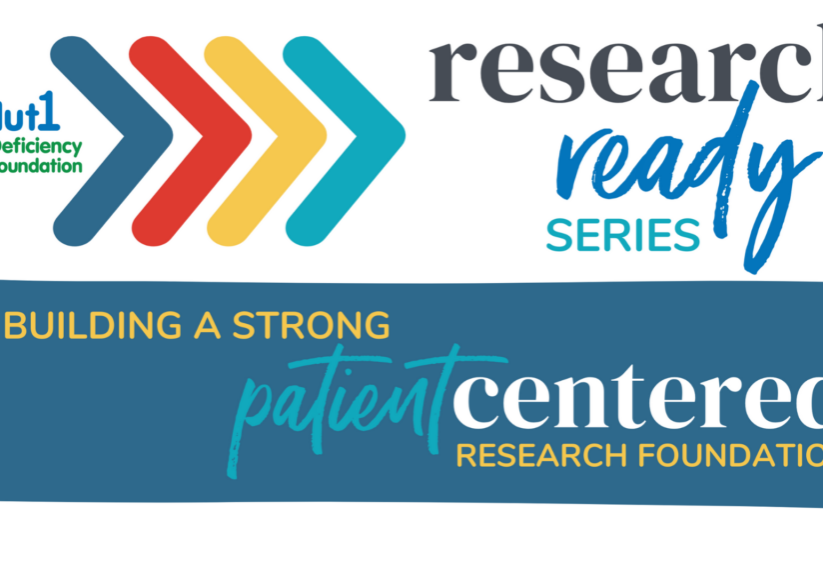Winter Research Roundtable: Adult Focus

Hello Glut1 Community! In this issue of Science with Sandra, I want to share about the Glut1 Deficiency Foundation Roundtable winter edition, which took place on January 24th.
The purpose of these meetings is to provide a forum for scientists and clinicians to share updates on current projects, engage in discussions, and foster collaborations so that we can accelerate progress toward our vision:
We dream of a brighter future where Glut1 Deficiency will be easy to diagnose early, treat effectively, and even cure completely.
The meeting started with a brief summary of projects currently taking place in the foundation, such as our patient-led research agenda, our Research Compass and upcoming opportunities to be involved.
The main topic of this convening was adult patients with Glut1 Deficiency and we had a wonderful group of speakers.

First was Dr. Elizabeth Felton. Dr. Felton is an assistant professor of neurology at the University of Wisconsin-Madison. She is a neurologist who specializes in epilepsy. Her clinical interests include dietary therapies for adults with epilepsy, special issues affecting women with epilepsy such as epilepsy during pregnancy and catamenial epilepsy, as well as surgical evaluation for the treatment of epilepsy. She spoke about pediatric to adult transition in Glut1 deficiency patients.
The key points of Dr. Felton’s presentation were the importance of starting to plan for the transition from pediatric to adult care early on. She recommends to start discussing a plan for transition around age 10 to have enough time to search for providers, and discuss the options among others involved in care. She also emphasized that when appropriate it is important to involve the patient in their medical care in their teen years, with the goal to becoming more independent and to make the transition easier in their adult years. She highlighted the importance of their independence preparing meals, checking ketone levels, and tracking seizures if necessary. Dr. Felton encouraged the implementation of the adult model of care at age 18 to avoid having a gap in care during the transition, and when possible, she recommends to consider having an advance meeting of the patient with adult neurologist to ease the transition.
Additionally, Dr. Felton talked about the lack of transition clinics and adult clinics dedicated to the ketogenic diet despite the increasing number of patients transitioning from pediatric care treatment or even the increasing numbers of newly diagnosed adult patients. Therefore, she suggests to start looking for information about adult care teams early on. Search for dietitians and neurologists who either have experience working with Glut1 patients if available in your area, or finding medical teams that have knowledge about the disease and the diet and relying on resources such as the Charlie Foundation to find professionals who have experience working with the ketogenic diet around the world. The Glut1 Deficiency Foundation maintains a Family Recommended Specialist list as well.
Our next speaker was Dr. Mackenzie Cervenka. Dr. Cervenka is an associate professor of neurology at Johns Hopkins University School of Medicine. She is the medical director of the Johns Hopkins Adult epilepsy diet center and the epilepsy monitoring unit. Dr. Cervenka’s research focuses on the efficacy of ketogenic diets in the treatment of adults with epilepsy and refractory status epilepticus. She also studies brain mapping in preparation for epilepsy surgery. She spoke about the multidisciplinary care of adults with Glut1 Deficiency.
Dr. Cervenka’s reported about the difference of symptoms published in the standard literature for Glut1 Deficiency patients and the actual symptoms reported by patients from their everyday experience in the patient voice survey published by the Glut1 Deficiency Foundation in 2021. Dr. Cervenka emphasized the importance of medical professionals caring for patients with Glut1 Deficiency for being aware of the symptoms reported by patients which affect their quality of life the most, such as cognitive and intellectual difficulties, as well as speech and communications issues and lack of independence. Having the information regarding these symptoms can help determine which multidisciplinary care treatment team can be most beneficial for the patients’ care, both at the pediatric and adult level.
Dr. Cervenka also discussed the importance of taking into consideration the change in symptoms for patients at different stages in their life, and particularly in the adult years because that can influence the type of ketogenic diet treatment they receive if appropriate. She talked about the need to consider all ketogenic diet therapy options for the treatment of adult patients and to tailor the selection to patient preference, support structure, autonomy, and mode of feeding.
Finally, Dr. Cervenka provided a list of multidisciplinary care approach to treating adults with Glut1 Deficiency, which I’m sharing here with you:
- Primary care
- Neurology (epilepsy, movement disorders, cognitive, headache)
- Genetics
- Genetic counseling
- Psychiatry
- Nutrition
- Pharmacy
- Pain management
- Rehabilitation services (physical, occupational, speech, cognitive behavioral)
- Support services (case management, social work, complex care, vocational)
She commented that this list is a suggestion she came up according to the symptoms reported by patients, but this list can be modified according to the patients’ needs.
The last speaker of our roundtable was Dr. Tanya McDonald. Dr. McDonald is an assistant professor of Neurology at Johns Hopkins University School of Medicine. She focuses on the diagnosis and treatment of epilepsy and seizures. Her specific interests include dietary therapies for adults with epilepsy, and evaluations for seizure surgery and epilepsy in women. Her research focuses on the impact of ketogenic diets like the modified Atkins diet, on cardiovascular health measures in adults with epilepsy.
She spoke about long-term management of adults using ketogenic diet therapy.
Dr. McDonald talked about the different types of ketogenic diet therapies that are available for dietary treatments including the classical ketogenic diet, the modified ketogenic diet, the modified Atkins diet, the low glycemic index treatment and the medium chain triglyceride oil diet. She focused on their differences in regards to the amount of carbohydrates, fat and protein allowed by each and the comparison to the standard American diet.
In addition, she discussed about the impact of the ketogenic diet on Glut1 Deficiency patients reported in the standard literature and on the patient voice survey published by the Glut1 Deficiency Foundation. She talked about the benefit of the diet on either seizure freedom or seizure reduction, also mentioning reports from patients and literature about the ketogenic diet benefits to help improve movement disorders and it’s positive impact on the cognitive abilities of patients with Glut1 Deficiency.
Dr. McDonald also discussed the recommendations for monitoring the ketogenic diet therapy in adults before and after starting the treatment. Among the recommendations are, to have basic nutrition counseling, height and weight and body mass index (BMI) measures, food allergies/intolerances and calorie count. She mentioned it is also important to have metabolic testing done for adult patient prior to starting the diet to determine possible contraindications against the diet therapy. Once the diet has started, recommendations are to continue the monitoring of BMI changes, seizures or movement disorders status if present, serial bone density scans particularly in patients who may have other risk factors for bone turnover and ketone monitoring. The recommendations in the early months after starting the ketogenic diet are to regularly check ketones in urine or blood; later, diet adjustments focus in optimizing diet response, minimizing side effects and optimizing sustainability of the diet, rather than focusing on a specific ketone level.
Finally, Dr. Mc Donald shared the results of studies on adult patients on the ketogenic diet and the effect on cardiovascular health. Results after 3 and 6 months don’t show a big impact of the ketogenic diet on cardiovascular health but they are planning a second phase of the study to continue a follow-up of patients at 1 and 2 years to have a better idea of the effect of the diet.
You can watch the recording of our Research Roundtable. Thank you for your interest!



